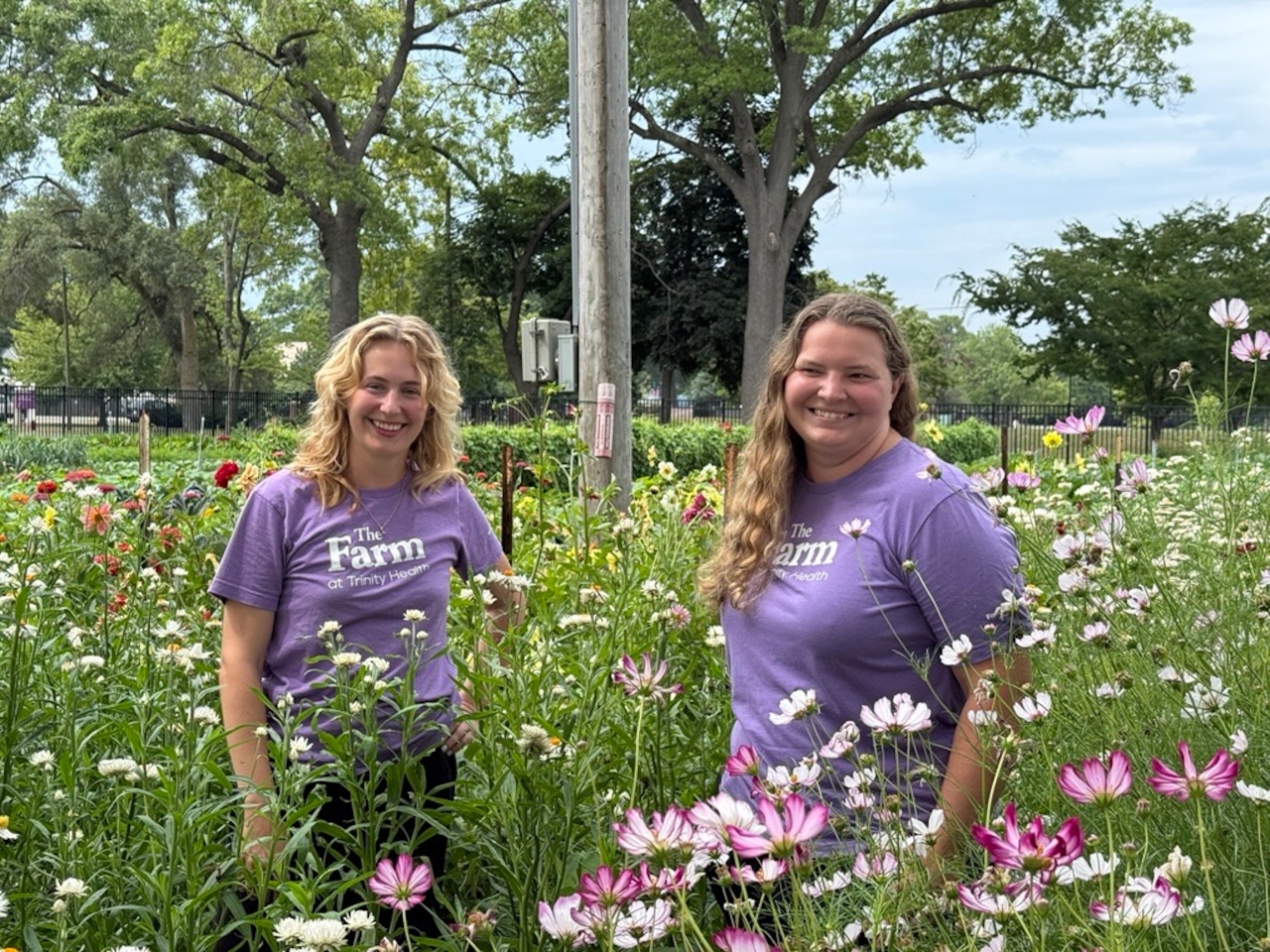
MUSKEGON, MI – A new state policy is allowing an urban farm in Muskegon to provide “produce prescriptions” to patients on Medicaid.
The McLaughlin Grows Urban Farm, at 175 E Larch Ave. and part of the Trinity Health Muskegon hospital system, is utilizing the Michigan In Lieu of Services program to reach people who need nutrition and face financial barriers to getting it.
“It creates an opportunity for both the state and us, as healthcare providers, to help prevent and treat disease for our patients before it has an opportunity to progress, and have a more significant impact on their life,” said Katelyn Smoger, director of Food is Medicine and the farm at Trinity Health. “This is wonderful for the families who receive it because they’re now getting high quality food, they’re going to be healthier, but it is also cost-saving.”
Recipients receive a free, weekly “produce prescription,” which is a box of fresh, in-season produce harvested that week from the farm. It could have a variety of vegetables, fruits and herbs, along with recipe cards.
Smoger said the program recently helped a newly pregnant mom who was identified as food insecure.
“What we’re doing is getting her access to the high-quality nutrition that she deserves,” Smoger said. “And the hope is that she will have a healthier weight baby. Maybe they won’t spend a day in the NICU (Neonatal intensive care unit) where they might have otherwise.”
Smoger said the state program is a “full-circle moment in seeing the acknowledgement of food as medicine from a policy standpoint.”
The educational-based farm already provides free produce to Trinity Health medical patients through a program called “Produce to Patients.”
Clinicians are able to stop by weekly to the farm and get a bag of produce and distribute it among their patients where they see fit.
The farm program began in 2009 and was managed by former nonprofit Community Encompass but transitioned to Trinity Health management in July 2024.
Sitting on one acre, there are rows of vegetables and fruit like cantaloupe, squash and celery, multiple greenhouses, a native plant garden and an area exclusively for flowers. A small staff and team of volunteers work to maintain the farm throughout the year.
The farm delivers 25 to 30 bouquets of flowers to the Trinity Health hospital next door, where volunteers work with nurses to disperse them.
“The idea is that we’re hopefully getting it to those patients who really need it most,” said Kaitlin Hermanson, manager of farm programs. “Maybe folks who have been in the hospital for a really long time, people who don’t have family in town to visit.”
Hermanson added that new mothers and people who are in the hospital on their birthday are also prioritized.
Children are brought to the farm weekly through partnerships with Muskegon schools and summer camps.
“A lot of times it’s the first time that a student has ever been able to pull a carrot out of the ground,” Hermanson said.
“There are not a ton of times during the school day when kids get an opportunity to put their hands in the dirt,” Hermanson said.
There have also been workshops bringing youth and their families together to take a plant home.
“A hospital-based farm can nourish not only your body, but also your mind and your spirit and things like that, too,” Smoger said. “Whether you’re coming out to get a workout with us and volunteering or you’re eating the veggies that we produce or receiving flowers that are being grown here or you’re a pollinator that’s bumbling around the farm – there’s a lot of benefit to having a space like this within your community or as a part of your hospital’s community benefit program.”
The urban farm partners with other farms around the county to provide enough produce for all of its shareholders, patients and Medicaid recipients.
One of those partners is Shady Side Farm, which provides a variety dry beans in the spring and fall seasons.
“You never know, buying from a third party, how it was grown, where it was grown, what methods were used what chemicals might or might not be on it and how it will affect your body,” said Mike Bronkema, farm co-owner and operator, stressing the importance of locally grown food and knowing where your food comes from.
In an effort to be more eco-conscious, Rebecca Droski signed her two daughters up for a summer camp at the farm.
“I was just blown away,” Droski said. “They get an idea of the hard work that goes into the food that we have each and every day.
“I also think it’s a great learning experience – kids are not outside as much as they used to be. A lot of them are very naïve to the outdoor environment, the bugs and getting their hands dirty.”
Droski was so inspired that she and her husband purchased a regular produce share with the farm.
She said it’s allowed her family to “experiment a lot more” with weekly meals.
“We are experimenting with different types of produce, like eggplant and thyme and rosemary. We tried a new type of squash,” Droski said. “It’s allowing us to eat healthier and eat what’s in season.”